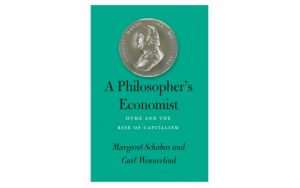february, 2021
17feb4:00 pm- 5:30 pmCelebrating Recent Work by Margaret Schabas and Carl Wennerlind
Event Details
New Books in the Arts & Sciences Celebrating Recent Work by Margaret Schabas and Carl Wennerlind Wednesday, February
Event Details
New Books in the Arts & Sciences
Celebrating Recent Work by Margaret Schabas and Carl Wennerlind
Wednesday, February 17, 2021 4:00pmVirtual Event at 4:00pm (EST)
New Books in the Arts & Sciences:
Celebrating Recent Work by Margaret Schabas and Carl Wennerlind
A Philosopher’s Economist: Hume and the Rise of Capitalism
By: Margaret Schabas and Carl Wennerlind
Although David Hume’s contributions to philosophy are firmly established, his economics has been largely overlooked. A Philosopher’s Economist offers the definitive account of Hume’s “worldly philosophy” and argues that economics was a central preoccupation of his life and work. Margaret Schabasand Carl Wennerlind show that Hume made important contributions to the science of economics, notably on money, trade, and public finance. Hume’s astute understanding of human behavior provided an important foundation for his economics and proved essential to his analysis of the ethical and political dimensions of capitalism. Hume also linked his economic theory with policy recommendations and sought to influence people in power. While in favor of the modern commercial world, believing that it had and would continue to raise standards of living, promote peaceful relations, and foster moral refinement, Hume was not an unqualified enthusiast. He recognized many of the underlying injustices of capitalism, its tendencies to promote avarice and inequality, as well as its potential for political instability and absolutism.
Hume’s imprint on modern economics is profound and far reaching, whether through his close friend Adam Smith or later admirers such as John Maynard Keynes and Friedrich Hayek. Schabas and Wennerlind’s book compels us to reconsider the centrality and legacy of Hume’s economic thought—for both his time and ours—and thus serves as an important springboard for reflections on the philosophical underpinnings of economics.
Click here to register via Zoom.
Please email disability@columbia.edu to request disability accommodations. Advance notice is necessary to arrange for some accessibility needs.
About the Authors:
Margaret Schabas is professor of philosophy at the University of British Columbia and the author of A World Ruled by Number and The Natural Origins of Economics. With Carl Wennerlind, she previously co-edited David Hume’s Political Economy.
Carl Wennerlind is professor of history at Barnard College, Columbia University and the author of Casualties of Credit: The English Financial Revolution, 1620-1720. He coedited David Hume’s Political Economy with Margaret Schabas.
About the Speakers:
Emma Rothschild is Jeremy and Jane Knowles Professor of History at Harvard University, Honorary Professor of History and Economics at the University of Cambridge, and a Fellow of Magdalene College, Cambridge. She is the author of Paradise Lost: The Decline of the Auto-Industrial Age, The Inner Life of Empires: An Eighteenth-Century History, and many articles in scholarly and other journals.
Victoria de Grazia is Moore Collegiate Professor of History at Columbia University. She is the author of The Perfect Fascist: A Story of Love, Power, and Morality and the forthcoming Soft Power Internationalism, 1990-2020, with Burcu Baykurt.
Turkuler Isiksel is Associate Professor of Political Science at Columbia University. Her research has appeared in Human Rights Quarterly, the European Journal of International Law, International Journal of Constitutional Law (I*CON), Global Constitutionalism, the European Law Journal, and Constellations.
Lisa Tiersten is Professor and Chair of History at Barnard College. Professor Tiersten’s research and teaching interests include modern European cultural history, the cultural history of capitalism, modern France, feminist theory, gender history, and comparative colonialisms. She has received the Emily Gregory Award for Excellence in Teaching from Barnard College.
Time
(Wednesday) 4:00 pm - 5:30 pm

